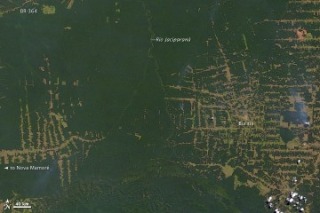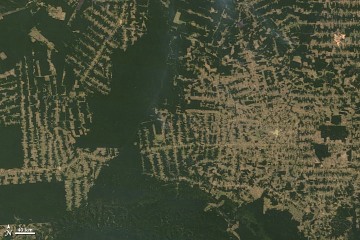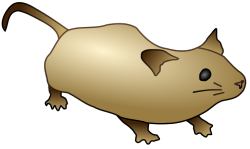 Deforestation in the state of Rondônia in western Brazil. Image: NASA, 30 July 2000The Anthropocene is the proposed name for a new geological epoch: one defining the timeframe in which humankind has exerted such power over the Earth that we alter its geology. But when did the Anthropocene begin?
Deforestation in the state of Rondônia in western Brazil. Image: NASA, 30 July 2000The Anthropocene is the proposed name for a new geological epoch: one defining the timeframe in which humankind has exerted such power over the Earth that we alter its geology. But when did the Anthropocene begin?
Some argue the Anthropocene started a couple of centuries ago:
"It's disconcerting to learn that many stratigraphers have come to believe that we are such an event—that human beings have so altered the planet in just the past century or two that we've ushered in a new epoch: the Anthropocene. The record of our impact leaving “may look as sudden and profound as that of an asteroid.”
 Deforestation in the state of Rondônia in western Brazil. Image: NASA, 2 August 2010From a "Paleo" perspective, the impact of the agricultural revolution around 10,000 years cannot be ignored. Even the Fertile Crescent was turned into a dessert by human activity thousands of years ago. As the images of an area of Brazil rainforest in 2000 and 2010 show, our frenetic activity continues to destroy forest for agriculture and pasture land. A "Paleo" perspective also recognizes the role of our ancestors in the megafauna extinctions of the late Paleolithic. As David Biello writes in Scientific American:
Deforestation in the state of Rondônia in western Brazil. Image: NASA, 2 August 2010From a "Paleo" perspective, the impact of the agricultural revolution around 10,000 years cannot be ignored. Even the Fertile Crescent was turned into a dessert by human activity thousands of years ago. As the images of an area of Brazil rainforest in 2000 and 2010 show, our frenetic activity continues to destroy forest for agriculture and pasture land. A "Paleo" perspective also recognizes the role of our ancestors in the megafauna extinctions of the late Paleolithic. As David Biello writes in Scientific American:
"Some argue that humans began changing the global environment about 50,000 years back, in the Pleistocene epoch, helping along if not outright causing the mass extinctions of megafauna, from mammoths to giant kangaroos, on most continents. Others date it to the emergence of agriculture some 7,000 years ago. The most definitive cases to be made coincide with the start of the industrial revolution and the dawn of the atomic age."
The recent paper "Dating the Anthropocene" published in Elementa proposes a broad scientific study to uncover the global history of the Anthropocene, the period of "human transformation of the terrestrial biosphere." It would require "an entirely revamped scientific effort in archaeology, ecology and paleontology, among other disciplines, at an unprecedented planetary scale." According to lead author Erle C. Ellis:
"This is great scientific work that can be done and needs to be done. It will help us define the role of humans in shaping the Anthropocene and will mark a scientific triumph for humanity: a full empirical account of our rise to global stewardship of the biosphere."
The greater challenge for humankind will be transitioning from dominance to stewardship.
Source
How Long Have Humans Dominated the Planet?
Related Posts
 Wednesday, December 11, 2013 at 08:53PM
Wednesday, December 11, 2013 at 08:53PM "My health the past 13 years has been a roller coaster ride. I had hyperlipidemia, elevated liver enzymes, several sebaceous cysts surgically removed, extremely severe acne (dermatologist treated 30 years), GERD, irritable bowel, and frequent strep throat. I had several extreme febrile episodes of unknown diagnosis. ...I frequently felt fatigued and just wanted to collapse when home from work; I had poor sleep for many years – I attributed it to being 40 and overweight. I also had significant joint pain and stiffness in my shoulders, neck, ankles and knees – again I attributed it to getting older, being overweight and past injuries."




